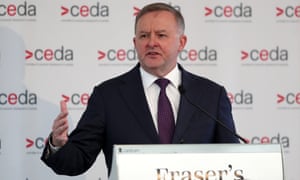The Labor leader wants blue-collar workers to know he knows they exist, isn’t ashamed of them and has them front of mind
Anthony
Albanese would be better off if he could wave a cheery goodbye and
retreat from the political fray until budget time next year, re-emerging
after Labor as a collective has finished absorbing the May election
loss, written all the books and all the blogs and the think pieces,
completed the close inspection of the navel, and worked out where it
wants to reposition itself.
But Albanese doesn’t have that luxury.
Just in case this point isn’t obvious, colleagues provided loyalty to Bill Shorten on the basis that unity would deliver them government in 2019. But unity didn’t deliver Labor government, it delivered another term in opposition, so Albanese’s leadership begins in a more contested place. The new leader has to keep moving. Hence the first “vision statement” delivered by the Labor leader in Perth on Tuesday, the first major speech of his opposition leadership.
Tuesday wasn’t billed as a grand plan, and it wasn’t a grand plan. It was more the sound of circles being squared.But Albanese doesn’t have that luxury.
Just in case this point isn’t obvious, colleagues provided loyalty to Bill Shorten on the basis that unity would deliver them government in 2019. But unity didn’t deliver Labor government, it delivered another term in opposition, so Albanese’s leadership begins in a more contested place. The new leader has to keep moving. Hence the first “vision statement” delivered by the Labor leader in Perth on Tuesday, the first major speech of his opposition leadership.
The predominant circle being squared was Albanese telling workers in traditional industries there is a role for them in a transitioning economy. Rather than presenting people with an ambitious social democratic program on an implicit assumption that voters are highly engaged and searching for something different (which, fundamentally, was the approach of the last parliamentary term), Albanese’s objectives are much simpler.
At this point, the Labor leader just wants blue-collar workers to know that Labor knows they exist, isn’t ashamed of them and has them very much front of mind as the opposition develops policies for this term. Hence all the messaging that coal workers can produce materials for windfarms, and Australia has a natural abundance of rare earths that can be value-added and used in the creation of renewable energy.
“Vision statement” one is climate change presented to voters through a materialist lens, not the post-material pitch of Kevin Rudd’s great moral challenge. Albanese, through this thinking out loud, is trying to work out whether there is a way that central Queensland can meet Melbourne, or in terms of the internal dynamics, that Mark Butler can meet Joel Fitzgibbon.
The second element of Tuesday was harking back to the tripartitism of the Hawke era, which is both a thing in itself, and a signal about the style of Labor leader Albanese wants to be. Albanese says he wants to create a new body called Jobs and Skills Australia that will bring together business leaders, state governments, trade unions and people from the regions to link up vocational education with workforce planning.
Projecting this particular approach to policy making sends a public signal that Albanese wants to deal with a range of stakeholders, not just the trade unions, and this mildly incendiary idea also surfaced elsewhere in the speech, with the Labor leader acknowledging that the contemporary labour market is … well … complicated.
He was positive about unions, and clear that workers needed protections, and he noted a number of workers were worried about being stuck in casual or insecure work.
Equally though, Albanese acknowledged some workers sought out jobs in the gig economy because they liked the flexibility. He flagged a conversation about “new forms of worker protections”, like making workers’ entitlements portable between their gigs.
This is all pretty thin, and pretty nascent, but the signalling is interesting in this sense: it points to a new way of approaching the industrial relations debate, where Labor might be prepared to think about this issue outside the prism of being handed the trade union wish list, and then fretting about how much of it can be delivered without the rightwing commentariat cranking up querulously in a way that’s damaging to Labor’s electoral prospects.
I wouldn’t be betting the house on a significant revolution in internal thinking, but I suspect at least some in the opposition are grappling with what that redrawn policy world might look like, given the old world of work where people toiled in one profession while being represented by one union is not the lived reality for the vast bulk of the Australian workforce, and hasn’t been for some time.
As the first step in a long journey, this is interesting, but Albanese is fully aware that the long journey is arduous, and uncertain.
- Katharine Murphy is Guardian Australia’s political editor

No comments:
Post a Comment